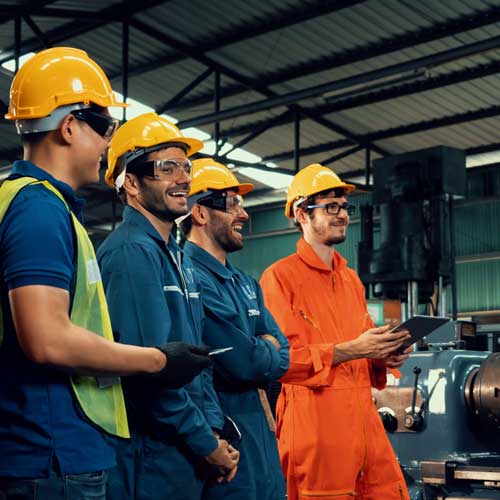Construction leaders can do more than they might think to support the health and wellbeing of their employees, despite the intrinsic challenges of working in the sector.
It’s well documented that construction workers can be at higher risk of mental health issues than those in other industries. A report by the Chartered Institute of Building in 2020 found that 26% of construction workers have experienced suicidal thoughts, and 97% had felt stressed in the previous 12 months. The Office for National Statistics, meanwhile, found that males working in skilled trade occupations had the second highest risk of suicide, accounting for almost a third of all male suicides between 2011 and 2015.
Supporting construction teams to support mental wellbeing can be difficult in an industry where so much takes place on-site. But the pandemic has helped employers foster a number of more flexible working practices, such as allowing workers to adapt their shifts to accommodate school drop-offs and enabling an element of site-based administration to be done remotely. Like other industries, many companies saw the pandemic as an opportunity to embrace wellbeing initiatives such as employee assistance programmes or Mental Health First Aid, in turn reducing the stigma around mental health conversations at work.
Debra Clark, head of wellbeing at Towergate Health and Protection, says the construction industry still faces inherent challenges in keeping staff mentally healthy and well, however. “Staff may be working away from home, and facing physical or health and safety concerns in their environment that can then lead to mental health problems. Often, if construction workers take time out they will not get paid, which creates stress around finances,” she explains. The fact that construction is a male-dominated environment can also bring its own challenges, with research showing that men are less likely to talk about their mental health.
Clark argues that changing the language around mental health in construction could go a long way to address these challenges. “Talk about resilience, how to stay mentally strong rather than focusing on mental illness or weakness,” she advises. At little or no cost, businesses can create ‘safe spaces’ where employees can chat about stressful issues on site, perhaps allocating a particular manager or trusted colleague as the go-to person who is open to a mental health conversation, she adds. “You don’t need to run a clinic as such, just invite people for a cup of tea. Train line managers to spot changes in staff, as these can often be an early indicator of an issue - for example, someone who is normally lively acting more quietly, or someone taking more time off than usual.”
The Construction Industry Training Board (CITB) has called for the industry to offer a centralised platform for information and support, alongside a wellbeing dashboard that shows the impact of wellbeing initiatives on the workforce. Various dedicated organisations can offer support, including Mates in Mind and the construction industry charity Lighthouse, which is dedicated to the emotional, physical and financial wellbeing of construction workers. Christine Husbands, commercial director at RedArc, which offers specialist mental health support to employers, adds that businesses can also boost teams by looking at policies and procedures through a wellbeing lens. “This could include looking at what flexibility could be introduced, or how you can make fragmented workforces more inclusive,” she says. “Survey employees regularly to understand their issues, what is helping and what could be improved.”
Flexible working plays a major role in enabling construction workers to have a better work-life balance, but there is a common misconception that this is impossible to offer. In a recent research programme by flexible work campaign group Timewise and Build UK, participants took part in a series of pilots of different working styles and arrangements, including: increasing home-working for site workers whose work was not fully manual; agreeing shifts by team, taking into account personal preferences; an output-based approach where workers could start earlier and leave once that day’s work was complete; staggered start and finish times; and a flexi-day approach where workers could accumulate hours and receive time off in lieu. Workers spoke of improvements to their family life and wellbeing, while the businesses that took part found that these arrangements had no detrimental impact on budgets or meeting client deliverables.
One of the key findings of the Timewise research was the importance of setting the tone from the top, with senior leaders advocating the benefits of flexibility and taking a proactive approach. One option is to trial new approaches at team level before taking stock of results and rolling out further, it advises. Ultimately, leaders and line managers need to balance the commercial requirements of their projects with the ongoing wellbeing of their teams, concludes Clark. “Line managers must be empathetic, but also consistent. There may be a limit to what you can do, but you can weigh up what you can cope with,” she says.
Expert solutions
Learn more about how Markel can help construction firms navigate their day-to-day challenges.
Solutions for construction